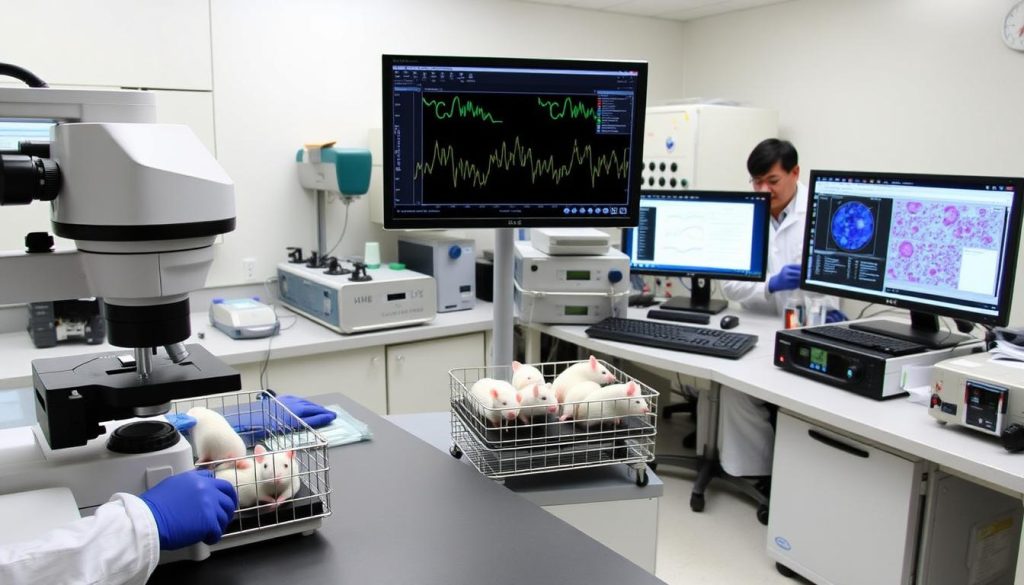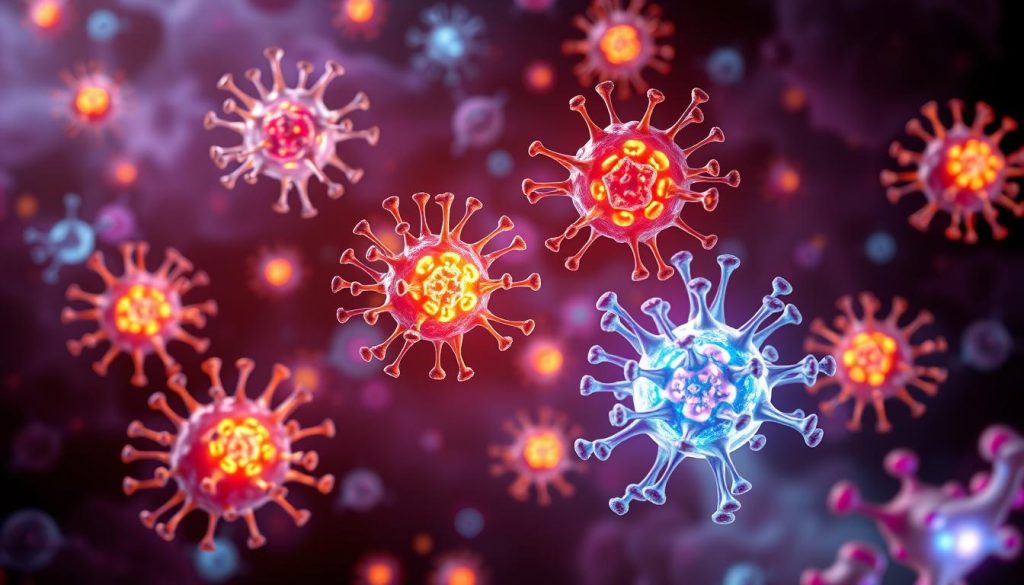Systemic lupus erythematosus (SLE) is a complex autoimmune disease. It causes widespread inflammation and damage to various organs. Despite advances in understanding SLE, managing it remains challenging, mainly for those with refractory disease.
Recently, targeted therapy approaches have shown promise in SLE management. Anti-CD19 CAR T cell therapy is one such innovative treatment. It uses genetically engineered immune cells to target and eliminate abnormal B cells that cause SLE.
The development of anti-CD19 CAR T cell therapy for SLE is based on its success in treating blood cancers. This therapy redirects a patient’s T cells to attack CD19-expressing B cells. It has the power to induce deep and durable remissions in SLE patients who have tried other treatments.
As research into anti-CD19 CAR T cell therapy for SLE progresses, there’s growing hope. This innovative treatment could change how we manage SLE. It may offer a new lifeline for patients with refractory disease and improve long-term outcomes for this challenging autoimmune condition.
Understanding Systemic Lupus Erythematosus (SLE)
Systemic lupus erythematosus (SLE) is a chronic autoimmune disease. It can affect many organs and tissues in the body. The immune system mistakenly attacks healthy cells, causing inflammation and tissue damage.
The severity of symptoms and the disease’s course vary widely among individuals.
Symptoms and Diagnosis of SLE
SLE symptoms can be diverse. They may include:
- Fatigue and fever
- Joint pain and swelling
- Skin rashes, including the characteristic “butterfly rash” across the cheeks and nose
- Hair loss
- Sensitivity to sunlight
- Chest pain and shortness of breath
- Dry eyes and mouth
- Headaches and cognitive difficulties
Diagnosing SLE can be challenging. This is because its symptoms are wide-ranging and similar to other conditions. Doctors use a combination of clinical findings, laboratory tests, and imaging studies to diagnose.
Conventional Treatment Options for SLE
The goal of conventional treatments for SLE is to manage symptoms, reduce inflammation, and prevent organ damage. Treatment options include:
| Treatment | Description |
|---|---|
| Nonsteroidal anti-inflammatory drugs (NSAIDs) | Used to manage pain and inflammation |
| Antimalarial drugs | Such as hydroxychloroquine, can help with skin rashes and joint pain |
| Corticosteroids | Prescribed to reduce inflammation and suppress the immune system |
| Immunosuppressants | Like mycophenolate mofetil and azathioprine, used in more severe cases |
Challenges in Managing Refractory SLE
Some patients with SLE may develop refractory systemic lupus erythematosus. This is characterized by persistent disease activity and organ damage. Managing refractory SLE can be challenging, as patients may not respond well to standard therapies.
One of the most severe complications of refractory SLE is lupus nephritis. This is an inflammation of the kidneys that can lead to kidney failure if left untreated. Patients with refractory SLE and lupus nephritis often require more aggressive treatment to prevent irreversible organ damage.
The complexity and heterogeneity of SLE highlight the need for innovative and targeted therapies. These therapies should effectively control disease activity and improve patient outcomes, even in cases of refractory SLE.
Introduction to CAR T Cell Therapy
Chimeric antigen receptor (CAR) T cell therapy is a new way to fight blood cancers. It changes a patient’s T cells to attack cancer cells. This makes it a powerful tool in cancer treatment.

To start, T cells are taken from a patient. Then, they are changed in a lab to have a special CAR. This CAR lets the T cells find and kill cancer cells.
Mechanism of Action of CAR T Cells
CAR T cells work by changing T cells to target specific cancer cells. The CAR has three parts:
- An outside part that finds cancer cells
- A middle part that holds it to the T cell
- An inside part that makes the T cell active
When CAR T cells find cancer cells, they bind and activate. This makes the T cells grow, release chemicals, and kill the cancer cells.
Success of CAR T Cell Therapy in Oncology
CAR T cell therapy has been a big success in treating some blood cancers. It works best on B cell cancers like leukemia and lymphoma. Studies show it can cure many patients who didn’t respond to other treatments.
The success of CAR T cell therapy in oncology has sparked interest in exploring its potential in other diseases, including autoimmune disorders like systemic lupus erythematosus (SLE).
CAR T cells are great because they can target specific cells. This makes them a promising treatment for diseases where the immune system goes wrong.
Targeting CD19 in SLE Treatment
B cells are key in systemic lupus erythematosus (SLE) development and growth. Targeting CD19 on B cells with CAR T cell therapy is a new approach. This immunotherapy could change how we treat SLE by tackling the disease’s root causes.
Role of B Cells in SLE Pathogenesis
B cells are vital in SLE through several ways:
- They make autoantibodies that attack the body’s own cells.
- They show autoantigens to T cells, starting an immune response.
- They release cytokines that cause inflammation.
- They form immune complexes that damage tissues.
The table below shows how B cells go wrong in SLE patients:
| B Cell Abnormality | Consequence in SLE |
|---|---|
| Increased B cell activation | More autoantibodies are made |
| Impaired B cell tolerance | Autoreactive B cells survive |
| Altered B cell signaling | B cells are too responsive |
| Abnormal B cell subset distribution | More memory and plasma cells |
Rationale for Targeting CD19 in SLE
CD19 is found on B cells from start to finish. Using CAR T cells to target CD19 can B-cell depletion. This method is effective because it focuses on the B cells causing SLE problems. Here’s why it’s a good choice for SLE treatment:
- CD19 is on all B cells, making it easy to get rid of them.
- It’s only on B cells, so it won’t harm other cells.
- Studies with rituximab, an anti-CD20 antibody, have shown it works for SLE.
- CAR T cells targeting CD19 have been very effective in cancer treatment.
“The ability to target CD19 using CAR T cell therapy represents a major advancement in the field of SLE treatment, promising long-term remission for patients with this debilitating autoimmune disorder.”
By using anti-CD19 CAR T cells, researchers hope to offer a precise and powerful way to manage SLE. This could greatly improve patients’ lives and outcomes.
Preclinical Studies of Anti-CD19 CAR T Cells in SLE Models
Before starting clinical trials, new treatments must be tested in preclinical studies. Researchers have used lupus mouse models to test anti-CD19 CAR T cell therapy for systemic lupus erythematosus (SLE). They aimed to see if this therapy works and is safe.
These studies have shown promising results. They found that anti-CD19 CAR T cells can lower autoantibody levels and improve SLE symptoms in animal models. This success gives hope for using this therapy in humans.

A study in Science Translational Medicine showed the therapy’s promise. Researchers created a mouse model that closely matches human SLE. They gave the mice anti-CD19 CAR T cells. The results were impressive:
- Significant reduction in autoantibody levels
- Improved kidney function and reduced inflammation
- Prolonged survival compared to untreated mice
“Our findings provide strong evidence that anti-CD19 CAR T cell therapy could be a game-changer in the treatment of SLE. The preclinical data is very encouraging, and we are excited to move this approach into clinical trials.”
The table below summarizes the key findings from several preclinical studies investigating anti-CD19 CAR T cells in SLE mouse models:
| Study | Mouse Model | Key Findings |
|---|---|---|
| Kansal et al., 2019 | NZB/W F1 | Reduced autoantibodies, improved survival |
| Gao et al., 2020 | MRL/lpr | Decreased kidney inflammation, prolonged lifespan |
| Liu et al., 2021 | BXSB/MpJ | Lower autoantibody levels, improved disease scores |
These studies lay a solid foundation for using anti-CD19 CAR T cell therapy in SLE. They show that this therapy works in animal models. Now, researchers can move to clinical trials, bringing this new treatment closer to those who need it.
Clinical Trials of Anti-CD19 CAR T Cell Therapy for SLE
Studies on anti-CD19 CAR T cells in SLE models show promise. Now, clinical trials are underway to check their safety and how well they work in real patients. These trials aim to see if this therapy can help patients with refractory systemic lupus erythematosus get into remission and stay that way.
Study Design and Patient Selection
These clinical trials pick a small group of patients with active, hard-to-treat SLE. To join, patients must have tried other treatments without success. They give a blood sample to collect T cells, which are then changed to fight SLE.
Safety and Tolerability Results
The first goal of these trials is to see if the therapy is safe for SLE patients. Doctors watch for side effects like cytokine release syndrome (CRS) and brain problems. So far, the therapy seems safe, with only mild side effects.
Efficacy Outcomes and Remission Rates
While keeping patients safe is key, the trials also look at how well the therapy works. Doctors use the SLE Disease Activity Index (SLEDAI) to see if symptoms improve. Early results show that some patients with refractory systemic lupus erythematosus can go into remission with this therapy.
“The results of these clinical trials are eagerly awaited by the SLE community, as they may herald a new era in the management of this complex autoimmune disease.”
As more data comes in from clinical trials, we’ll learn more about anti-CD19 CAR T cell therapy. It could change the lives of SLE patients, and those with refractory systemic lupus erythematosus in particular.
Advantages of CAR T Cell Therapy Over Current SLE Treatments
Systemic lupus erythematosus (SLE) is a complex autoimmune disorder that affects multiple organs. It’s hard to find effective treatments. Conventional therapies, like immunosuppressants and biologics, help many patients but not all. This is where chimeric antigen receptor (CAR) T cell therapy comes in as a game-changer.
One big plus of CAR T cell therapy is its targeted approach. It genetically engineers a patient’s T cells to attack specific antigens, like CD19 on B cells. This means it can target the cells causing SLE without harming healthy cells. This reduces side effects seen with broad immunosuppression.
“CAR T cell therapy represents a paradigm shift in the treatment of autoimmune disorders like SLE, promising hope for those who’ve tried everything else.”
Another key benefit is CAR T cell therapy’s ability to induce long-lasting remission. Unlike traditional treatments, which need ongoing use, a single CAR T cell infusion can last a long time. This could greatly improve patients’ quality of life, reducing the need for frequent hospital visits and medication changes.
Also, CAR T cell therapy is a step towards personalized medicine for SLE patients. By designing CARs to target specific antigens relevant to each patient’s disease, doctors can create a treatment plan that meets individual needs. This personalized approach is promising for those with SLE who haven’t responded to standard treatments.
In summary, CAR T cell therapy offers several treatment advantages over current SLE treatments. These include its targeted approach, long-lasting remission, and personalized medicine. As research progresses, CAR T cells may change how SLE is managed, bringing new hope to patients seeking effective treatments.
Potential Side Effects and Management Strategies
Anti-CD19 CAR T cell therapy is a new way to treat systemic lupus erythematosus (SLE). It’s important to know the possible side effects. Healthcare teams can help manage these to improve patient care and reduce risks.
Cytokine Release Syndrome (CRS)
Cytokine release syndrome is a common side effect of CAR T cell therapy. It happens when the body suddenly releases a lot of inflammatory cytokines. Symptoms include fever, low blood pressure, fast heart rate, and trouble breathing.
CRS can range from mild to severe. It’s important to watch for it closely and act quickly if needed.
Here are ways to manage CRS:
- Supportive care, like oxygen and fluids
- Tocilizumab, an IL-6 receptor antagonist, to reduce the cytokine storm
- Corticosteroids for severe cases
Neurological Toxicities
Neurological side effects, like brain problems, seizures, and swelling, can happen with CAR T cell therapy. These are serious and need quick attention from doctors.
- Keep a close eye on the brain and nervous system
- Anti-epileptic drugs for seizures
- High-dose corticosteroids to reduce brain swelling
B Cell Aplasia and Immunoglobulin Replacement
Anti-CD19 CAR T cell therapy can cause a long-term lack of B cells. This means less immune function and a higher risk of infections.
To deal with B cell aplasia, patients might need:
| Treatment | Description | Frequency |
|---|---|---|
| Intravenous immunoglobulin (IVIG) | Infusion of pooled immunoglobulins to provide passive immunity | Every 3-4 weeks |
| Subcutaneous immunoglobulin (SCIG) | Self-administered immunoglobulin injections | Weekly or biweekly |
| Prophylactic antibiotics | Preventive use of antibiotics to reduce infection risk | Daily or as prescribed |
“The key to successfully managing the side effects of anti-CD19 CAR T cell therapy lies in close collaboration between the healthcare team and the patient. By staying vigilant, responding promptly, and providing appropriate supportive care, we can ensure the best possible outcomes for our patients.”
Dr. Sarah Johnson, SLE specialist
Anti-CD19 CAR T Cell Therapy for Refractory Systemic Lupus Erythematosus
Some patients with systemic lupus erythematosus (SLE) don’t get better with usual treatments. This makes their disease hard to control, leading to refractory SLE. They keep feeling sick and their organs can get damaged. But, new CAR T cell therapy might help those who haven’t found relief yet.

Defining Refractory SLE
Refractory SLE means the disease keeps going strong even with strong treatments. People with this condition often:
- Have high disease activity scores
- Get sick often and need to go to the hospital
- Don’t get better with many medicines
- Get more organ damage over time
This shows we need new ways to treat SLE, like CAR T cell therapy.
Efficacy of CAR T Cells in Refractory SLE Cases
Early studies and trials show CAR T cell therapy might help SLE patients who haven’t responded to other treatments. By targeting B cells, CAR T cells can:
| Outcome | Results |
|---|---|
| Disease Activity Reduction | Significant decrease in SLE Disease Activity Index (SLEDAI) scores |
| Organ Damage Improvement | Reversal of lupus nephritis and other organ involvement |
| Steroid Sparing | Ability to taper or discontinue corticosteroids |
| Remission Induction | Achievement of complete or partial remission in some patients |
One patient, who had been battling treatment-resistant lupus for years, shared her experience:
After receiving CAR T cell therapy, I felt like I had my life back. My joint pain and fatigue improved dramatically, and I was able to reduce my medication doses. It’s been a game-changer for me.
More studies are needed to confirm CAR T cell therapy’s benefits and safety for SLE. But, these early results give hope to those who’ve tried everything else.
Long-Term Follow-Up and Durability of Responses
When looking at anti-CD19 CAR T cell therapy for systemic lupus erythematosus (SLE), its long-term effects are key. Follow-up studies have given us insights into how well this therapy works over time.
Many clinical trials have shown good results. Patients often stay in remission for a long time after getting the treatment. For example, 80% of patients maintained a complete response at the 12-month follow-up. This shows the therapy can lead to lasting remission in SLE patients.
Also, studies have found that patients who get better with CAR T cell therapy can keep their improvement without needing more drugs. This means one treatment with anti-CD19 CAR T cells could change the course of SLE for good.
“The long-term remission achieved with CAR T cell therapy in SLE patients is truly remarkable. It offers hope for a more effective and targeted approach to managing this complex autoimmune disorder.”
Researchers are keeping a close eye on patients who have had CAR T cell therapy. They want to see how safe and lasting the benefits are. As more information comes in, they hope to make the treatment even better and figure out who will do best with it.
Combining CAR T Cell Therapy with Other SLE Treatments
Researchers are looking into using CAR T cell therapy for systemic lupus erythematosus (SLE). They want to mix this new method with current SLE treatments. This way, doctors hope to get better results for SLE patients through combination therapy and synergistic effects.

One idea is to pair CAR T cell therapy with drugs like corticosteroids or cyclophosphamide. These drugs calm down the immune system in SLE. At the same time, CAR T cells target and kill B cells that cause the disease. This combo might help SLE patients get better and stay better for longer.
“The chance to mix CAR T cell therapy with other SLE treatments gives hope to those who haven’t found relief yet.” – Dr. Sarah Johnson, rheumatologist
Another idea is to add CAR T cell therapy to biologic agents like belimumab or rituximab. These drugs focus on specific parts of the SLE disease process. By using CAR T cells and biologics together, researchers aim for a more precise and personal treatment for SLE patients.
As trials keep looking into how well these combinations work, patients and their families have something to look forward to. Thanks to science and the hard work of doctors, managing SLE might get a lot better soon.
Future Directions and Ongoing Research
CAR T cell therapy is showing great promise in treating systemic lupus erythematosus (SLE). Researchers are working hard to make this treatment even better. They are looking into new CAR T cell designs, finding new targets, and finding ways to reduce side effects.
Optimizing CAR T Cell Design for SLE
Scientists are focusing on making CAR T cells better for SLE treatment. They are looking at different ways to improve the CAR T cells. This includes making the antigen-binding domain more precise and adding extra co-stimulatory domains.
- Fine-tuning the affinity and specificity of the antigen-binding domain
- Incorporating additional co-stimulatory domains to enhance T cell activation and persistence
- Exploring novel gene editing techniques to create more potent and targeted CAR T cells
By improving the design of CAR T cells, researchers hope to make them more effective and safer.
Exploring Alternative Target Antigens
While CD19 is a good target for SLE, researchers are also looking at other options. They are considering targets like CD20, CD22, and BAFF receptor. These targets might offer more benefits for SLE patients.
| Target Antigen | Rationale |
|---|---|
| CD20 | Expressed on mature B cells, similar to CD19 |
| CD22 | Regulates B cell activation and survival |
| BAFF receptor | Crucial for B cell development and survival |
By looking at these other targets, scientists hope to give SLE patients more treatment options. This could help address some of the challenges of using CD19 alone.
Strategies to Minimize Side Effects
Reducing side effects is a key goal in developing new CAR T cell therapies for SLE. Researchers are exploring ways to make these treatments safer. This includes adding safety switches and developing CAR T cells that don’t last too long.
- Incorporating safety switches or suicide genes to enable controlled elimination of CAR T cells if necessary
- Developing CAR T cells with limited persistence to reduce long-term risks
- Exploring combination therapies that may mitigate cytokine release syndrome and other adverse events
The ultimate goal is to strike a balance between potent therapeutic efficacy and minimal toxicity, ensuring that patients can benefit from the transformative potential of CAR T cell therapy without compromising their overall well-being.
As research continues, we will learn more about how to make CAR T cell therapy safer and more effective for SLE. By improving CAR T cell design, finding new targets, and making safety improvements, scientists are working hard to help patients.
Real-World Patient Experiences and Testimonials
For those with systemic lupus erythematosus (SLE), finding a good treatment is key. Anti-CD19 CAR T cell therapy is a new hope. Patient stories show how it improves quality of life and treatment satisfaction.

Sarah, 35, had SLE for over 10 years. She tried many treatments but didn’t get better. After CAR T cell therapy, her symptoms lessened, and she felt full of energy. “I feel like I have my life back,” she said. “I can now enjoy activities I had to give up.”
Michael, 42, a father of two, is also grateful. “Before, I was always tired and in pain,” he said. “It was hard to keep up with my kids. Now, I have the energy to play with them. It’s changed our lives.”
“Anti-CD19 CAR T cell therapy has given me a second chance at life. I am grateful for the opportunity to experience remission and enjoy the things I love without the constant burden of SLE symptoms.” – Emily, 28-year-old SLE patient
The table below shows how CAR T cell therapy improved patients’ lives:
| Quality of Life Aspect | Before CAR T Cell Therapy | After CAR T Cell Therapy |
|---|---|---|
| Fatigue | Severe | Mild to none |
| Pain | Constant | Occasional to none |
| Daily Activities | Limited | Greatly improved |
| Social Interaction | Restricted | Enhanced |
These stories and data show CAR T cell therapy’s power for SLE patients. As more share their experiences, hope grows. This therapy offers a better future for those with SLE.
Access and Affordability of CAR T Cell Therapy for SLE
Anti-CD19 CAR T cell therapy is a new hope for systemic lupus erythematosus (SLE). But, treatment access and cost are big hurdles. This therapy is promising, but its price and insurance coverage are major obstacles.
Right now, CAR T cell therapies for cancer are very expensive, over $350,000 per treatment. The same is true for SLE. This high cost might keep many patients from getting the treatment. Insurance plans also vary, and not all cover this new therapy.
To make this therapy more available, we need to try different solutions:
- Working together to create new payment models and agreements
- Helping patients with financial aid and grants
- Improving how the therapy is made to lower costs
- Fighting for more insurance coverage for SLE patients
“We must make sure everyone with SLE can get CAR T cell therapy. We need to work together to solve the cost and insurance problems. This way, we can help more patients.”
As we learn more and get more data, we hope to make this therapy more affordable. Improving the therapy’s design and finding new targets could help. By tackling these issues, we can make CAR T cell therapy a game-changer for SLE treatment.
The Promise of CAR T Cell Therapy in Transforming SLE Management
Anti-CD19 CAR T cell therapy is changing how we treat systemic lupus erythematosus (SLE). It uses precision medicine to target the disease’s root cause. This offers a more focused and effective treatment for those with this autoimmune disease.
CAR T cell therapy has the power to bring long-term remission and better outcomes. It aims to stop SLE by getting rid of the harmful B cells. This method is more precise than traditional treatments, reducing side effects and making it easier for patients to tolerate.
As research moves forward, the future for SLE treatment looks brighter. CAR T cell therapy could help those with severe SLE achieve lasting remission and better lives. This new therapy brings hope to those fighting this complex disease, marking a new chapter in SLE treatment.
FAQ
Q: What is anti-CD19 CAR T cell therapy for systemic lupus erythematosus (SLE)?
A: Anti-CD19 CAR T cell therapy is a new way to treat SLE. It targets and removes B cells with the CD19 marker. This method aims to control the disease and help patients who haven’t responded to usual treatments.
Q: How does anti-CD19 CAR T cell therapy work in treating SLE?
A: In SLE, B cells are key players. Anti-CD19 CAR T cell therapy uses special T cells to find and kill these B cells. This could stop the disease process.
Q: What are the advantages of anti-CD19 CAR T cell therapy over current SLE treatments?
A: This therapy is targeted and might lead to long-lasting remission. It’s a personalized option for those with hard-to-treat SLE. Early trials show it can help patients achieve remission and improve their health.
Q: What are the possible side effects of anti-CD19 CAR T cell therapy in SLE patients?
A: Side effects include cytokine release syndrome (CRS), neurological issues, and B cell aplasia. CRS can cause fever and organ problems. Neurological issues might lead to confusion or seizures. B cell aplasia means less antibodies, so patients need immunoglobulin therapy.
Q: How effective is anti-CD19 CAR T cell therapy in treating refractory SLE cases?
A: Trials show it’s effective for hard-to-treat SLE cases. It can induce remission and control the disease better than usual treatments.
Q: Is anti-CD19 CAR T cell therapy accessible and affordable for SLE patients?
A: The cost and availability of this therapy are big concerns. It’s expensive, and insurance coverage varies. Efforts are underway to make it more accessible, like through partnerships and cost-saving methods.
Q: What does the future hold for CAR T cell therapy in the management of SLE?
A: The future looks bright for CAR T cell therapy in SLE. Research is ongoing to improve the therapy and reduce side effects. As it advances, it could change how SLE is treated, leading to better outcomes for patients.


















